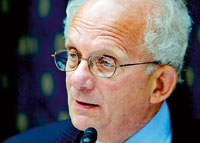The House Foreign Affairs Committee just spent two full days and nights marking up a State Department and foreign operations authorization bill in an effort that the committee's ranking Democrat says was a "waste of time" for a bill that has no chance of becoming law.
"There's no doubt that this was a bad bill as it started, and even though we knew it could get worse, we could not imagine it would get as bad as it did," Rep. Howard Berman (D-CA), said in a Friday interview with The Cable. Berman said the original draft of the bill, which included sweeping restrictions on foreign aid to countries around the world, was bad enough. But the over 100 amendments introduced by GOP congressmen sent an even more harmful signal to the world, he said -- namely, that the United States wanted to disengage from international forums and punish countries that don't always agree with the U.S. government.
 |
| Howard Berman |
"The thinking [on the GOP side] is, ‘something happens I don't like, and the way to deal with it is I throw a tantrum.' It's a series of tantrums," Berman said. "It's an absence of a notion between what we're doing and what the consequences of what we're doing are. It's operating from a gut instinct and them not using their heads." What's more, since the bill has so many provisions and amendments that would undo the Obama administration's foreign policy, it's destined to fail in the Democrat-led Senate, much less be signed by the president.
"This bill's never going to be law. We spent from morning until late night, two straight days and hundreds of hours surrounding that markup, dealing with amendments and language on something that will have no impact on U.S. foreign policy because it will never come close to becoming law," Berman said.
He compared it to his time as a student in the Young Democrats movement in college, when the group would have spirited policy debates and issue resolutions just for the sake of theatre and practice. "At the end of the day it was just a piece of paper, and that's what this is," he said.
But unlike the Young Democrats of the 1960s, the HFAC markup in 2011 does have a real and negative effect on U.S. power and influence, Berman said, because those watching the debate assume it has real implications.
"It was a waste of time, but people around the world in other countries and other governments don't know that it's a total waste of time and will never become law and they think this is where U.S. policy is heading and they are going to react," he said. "So even the act of doing this hurt American interests, because it creates anger and hostility and makes all the things we need to do more difficult."
Berman highlighted an amendment to the bill sponsored by Western Hemisphere subcommittee chairman Connie Mack (R-FL) that would withdraw all U.S. contributions to the Organization of American States, calling it a "very extreme position." He also criticized another amendment that would prohibit assistance to countries that vote against America at the United Nations a majority of the time on any and all votes, pointing out the amendment would prevent the US from sending aid to Jordan -- despite the fact that Jordan is among the most pro-Western Arab countries and a supporter of Middle East peace.
"Passing an amendment to prohibit any assistance to any country where any government votes against us at the U.N. more than 50 per cent of the time... whose interest is that serving?" Berman said. The U.N. amendment would also make aid to Pakistan impossible because Pakistan would fall into that category. But Berman pointed out that directly contradicted the committee's message when the committee voted 39-5 not to cut off all assistance to Pakistan, rejecting an amendment by Rep. Dana Rohrabacher. "Faced with an opportunity to cut off all economic aid to Pakistan, they rejected it on an overwhelmingly low vote. But in three other amendments that the majority supported, they cut off all aid to Pakistan," he said.
The bill also would impose a ban on funding for international organizations that offer abortion counselling to clients, a version of what's known as the Mexico City Policy. Berman called it the "Mexico City Policy on steroids," because it does not allow exemptions for HIV/AIDS funding. Some of the bill's provisions that Berman thought most counterproductive were more local. For example, the bill would eliminate USAID's new budget office. "We want a more efficient and focused development assistance, we want better controls, so let's make sure that the agency that's in charge of this can't function," said Berman, characterizing the provision as "going back to the goal of incapacitating USAID."
A spokesman for HFAC Chairwoman Ileana Ros-Lehtinen (R-FL) said she was unavailable for an interview on Friday due to her travel schedule.
Courtesy:thecable.foreignpolicy.com |


